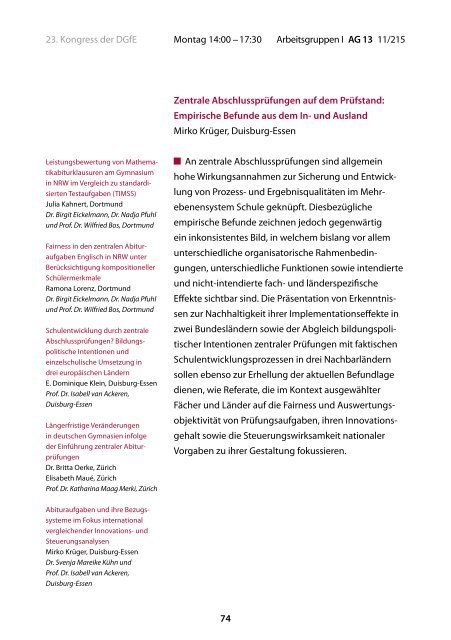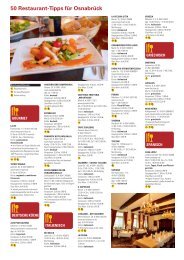23. Kongress der DGfE 12. – 14. März 2012 Osnabrück ...
23. Kongress der DGfE 12. – 14. März 2012 Osnabrück ...
23. Kongress der DGfE 12. – 14. März 2012 Osnabrück ...
Sie wollen auch ein ePaper? Erhöhen Sie die Reichweite Ihrer Titel.
YUMPU macht aus Druck-PDFs automatisch weboptimierte ePaper, die Google liebt.
<strong>23.</strong> <strong>Kongress</strong> <strong>der</strong> <strong>DGfE</strong> Montag 14:00 <strong>–</strong> 17:30 Arbeitsgruppen I AG 13 11/215 <strong>23.</strong> <strong>Kongress</strong> <strong>der</strong> <strong>DGfE</strong> Montag 14:00 <strong>–</strong> 17:30 Arbeitsgruppen I AG 14 11/116<br />
Leistungsbewertung von Mathematikabiturklausuren<br />
am Gymnasium<br />
in NRW im Vergleich zu standardisierten<br />
Testaufgaben (TIMSS)<br />
Julia Kahnert, Dortmund<br />
Dr. Birgit Eickelmann, Dr. Nadja Pfuhl<br />
und Prof. Dr. Wilfried Bos, Dortmund<br />
Fairness in den zentralen Abituraufgaben<br />
Englisch in NRW unter<br />
Berücksichtigung kompositioneller<br />
Schülermerkmale<br />
Ramona Lorenz, Dortmund<br />
Dr. Birgit Eickelmann, Dr. Nadja Pfuhl<br />
und Prof. Dr. Wilfried Bos, Dortmund<br />
Schulentwicklung durch zentrale<br />
Abschlussprüfungen? Bildungspolitische<br />
Intentionen und<br />
einzelschulische Umsetzung in<br />
drei europäischen Län<strong>der</strong>n<br />
E. Dominique Klein, Duisburg-Essen<br />
Prof. Dr. Isabell van Ackeren,<br />
Duisburg-Essen<br />
Längerfristige Verän<strong>der</strong>ungen<br />
in deutschen Gymnasien infolge<br />
<strong>der</strong> Einführung zentraler Abiturprüfungen<br />
Dr. Britta Oerke, Zürich<br />
Elisabeth Maué, Zürich<br />
Prof. Dr. Katharina Maag Merki, Zürich<br />
Abituraufgaben und ihre Bezugssysteme<br />
im Fokus international<br />
vergleichen<strong>der</strong> Innovations- und<br />
Steuerungsanalysen<br />
Mirko Krüger, Duisburg-Essen<br />
Dr. Svenja Mareike Kühn und<br />
Prof. Dr. Isabell van Ackeren,<br />
Duisburg-Essen<br />
Zentrale Abschlussprüfungen auf dem Prüfstand:<br />
Empirische Befunde aus dem In- und Ausland<br />
Mirko Krüger, Duisburg-Essen<br />
An zentrale Abschlussprüfungen sind allgemein<br />
hohe Wirkungsannahmen zur Sicherung und Entwick-<br />
lung von Prozess- und Ergebnisqualitäten im Mehrebenensystem<br />
Schule geknüpft. Diesbezügliche<br />
empirische Befunde zeichnen jedoch gegenwärtig<br />
ein inkonsistentes Bild, in welchem bislang vor allem<br />
unterschiedliche organisatorische Rahmenbedingungen,<br />
unterschiedliche Funktionen sowie intendierte<br />
und nicht-intendierte fach- und län<strong>der</strong>spezifische<br />
Effekte sichtbar sind. Die Präsentation von Erkenntnissen<br />
zur Nachhaltigkeit ihrer Implementationseffekte in<br />
zwei Bundeslän<strong>der</strong>n sowie <strong>der</strong> Abgleich bildungspolitischer<br />
Intentionen zentraler Prüfungen mit faktischen<br />
Schulentwicklungsprozessen in drei Nachbarlän<strong>der</strong>n<br />
sollen ebenso zur Erhellung <strong>der</strong> aktuellen Befundlage<br />
dienen, wie Referate, die im Kontext ausgewählter<br />
Fächer und Län<strong>der</strong> auf die Fairness und Auswertungsobjektivität<br />
von Prüfungsaufgaben, ihren Innovationsgehalt<br />
sowie die Steuerungswirksamkeit nationaler<br />
Vorgaben zu ihrer Gestaltung fokussieren.<br />
Integrating workplace experiences<br />
within higher education programs:<br />
Curriculum and pedagogic practices<br />
Prof. Dr. Stephen Billett, Brisbane<br />
Un<strong>der</strong>standing work-related<br />
learning: the role of individual and<br />
job-related variables<br />
Prof. Dr. David Gijbels, Antwerp<br />
Work-related learning as social<br />
activities un<strong>der</strong> qualitative and<br />
quantitative analytical perspectives<br />
Prof. Dr. Tuire Palonen, Turku<br />
Prof. Dr. Erno Lehtinen, Turku<br />
Prof. Dr. Anneli Eteläpelto, Jyväskylä<br />
Workplace learning from (errorrelated)<br />
feedback in vocational<br />
education and training (VET)<br />
Alexan<strong>der</strong> Baumgartner, Konstanz<br />
Dr. Andreas Rausch, Bamberg<br />
Prof. Dr. Jürgen Seifried, Konstanz<br />
Affordances for work related<br />
individual and collective learning<br />
of teachers in middle vocational<br />
education<br />
Prof. Dr. Robert-Jan Simons, Utrecht<br />
Dr. Bert van Veldhuizen,<br />
Arnhem and Nijmegen<br />
Discussant<br />
Prof. Dr. Päivi Tynjälä, Jyväskylä<br />
74 75<br />
Workplace learning <strong>–</strong> crossing the boundary<br />
between working and learning<br />
Prof. Dr. Christian Harteis, Pa<strong>der</strong>born<br />
Dr. Andreas Rausch, Bamberg<br />
In recent years, the legitimate interest in workplace<br />
learning has been continuously increasing, which<br />
is apparent in the ongoing discussion on life-long<br />
learning and the establishment of mo<strong>der</strong>n business<br />
concepts. Current approaches emphasise the learning<br />
potential of workplaces, however, workplaces do not<br />
automatically promote learning. It is rather an educational<br />
task to design workplaces as environments of<br />
rich learning potential without neglecting business<br />
demands. International experts within the working<br />
group discuss about the relationship between working<br />
and learning, namely: Stephen Billett (Australia),<br />
David Gijbels (Belgium), Tuire Palonen (Finland), Anneli<br />
Eteläpelto (Finland), Alexan<strong>der</strong> Baumgartner (Germany),<br />
Andreas Rausch (Germany), Jürgen Seifried (Germany),<br />
Robert-Jan Simons (Netherlands), Bert van Veldhuizen<br />
(Netherlands) and Päivi Tynjälä (Finland, Discussant).<br />
Montag



